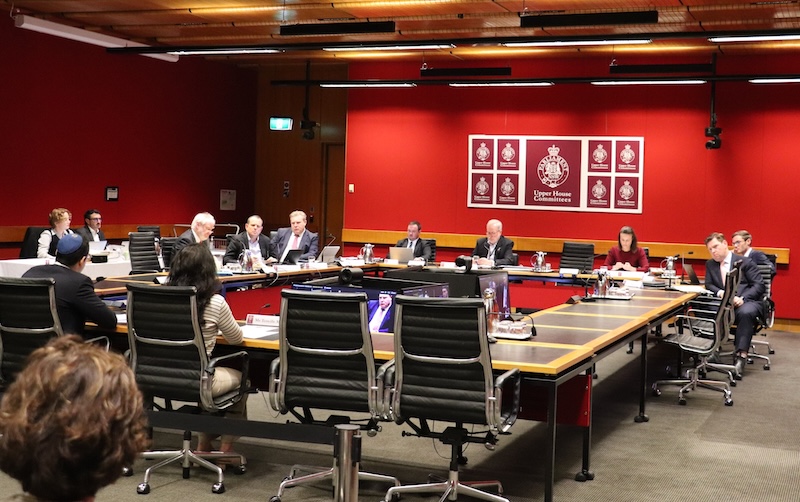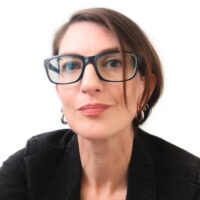Anthony Albanese is finally outraged at Israel’s aid blockade, while the Zionist lobby is losing the argument in the NSW Parliament’s antisemitism inquiry. Emma Thomas with the story.
Right-wing Zionist groups, claiming to represent all Australian Jews, have attempted to control the narrative around antisemitism. Last week’s parliamentary hearing into antisemitism in NSW suggests they might be losing control.
Last Monday’s hearing began with David Ossip of the NSW Board of Deputies claiming to speak on behalf of “the Jewish community more broadly”. When statements made by other members of the Jewish community revealed that claim to be false, Ossip reportedly declared that the inquiry was “‘hijacked’ by fringe Jewish groups.”
“Far right hate group”, the Australian Jewish Association (AJA), expressed similar concerns about “Jewish antisemitism”, which it attributes to “A tiny fringe group claiming Jewish heritage [that] parrots anti-Jewish rhetoric, [and is] rejected by the broader Jewish community”.
Sky News later chimed in, with one commentator on an all-non-Jewish panel claiming that those “fringe” Jewish speakers “don’t actually represent Jewish people.”
Would-be gatekeepers
A member of the anti-Zionist Jewish group, Tzedek Collective, told MWM, while anti-Zionist Jews have long copped antisemitic abuse from Zionists, the NSW inquiry showcased a newer phenomenon:
Zionist efforts to deny anti-Zionist Jews’ Jewishness itself.
The AJA’s contention that anti-Zionist activists were “claiming Jewish heritage” was a case in point. Asked by a committee member whether the AJA was “trying to pass doubt upon whether those groups really are Jewish”, AJA president, Robert Gregory, responded, “I wasn’t trying to cast doubt, but there has been well-documented examples where various people who’ve presented themselves as Jewish anti-Israel activists were then exposed as not actually having Jewish background.”
When the committee member followed up by suggesting that sounded like an attempt to cast doubt about other speakers’ Jewish heritage, Gregory responded, “We haven’t made that suggestion, but, as I just mentioned, it has been exposed in different cases internationally that that in fact is the case – that people were claiming Jewish identity and are not. I’ll just repeat: We didn’t, in our submission, make that point about any particular person, if that’s what you are implying.”
Attempts to deny someone’s Jewish heritage by equating heritage with political and ethical beliefs is “chillingly reminiscent of German race science from the 1930s”, said Sinanian, whose Jewish relatives were murdered by the Nazis at Sobibor extermination camp. It is “the height of antisemitism,” he said.
Delegitimising disagreement
Although questions about the Jewishness of the Jewish speakers, along with the Jewish groups they represent, were seemingly settled, many speakers highlighted other Zionist efforts to delegitimise political disagreement within the Jewish community.
By labelling parts of the community as “fringe”, Zionist organisations were attempting to “delegitimise my existence, my family’s existence and the existence of all the anti-Zionist Jews that I know”, Cathy Peters of Jewish Voices of Inner Sydney said.
Founder of Jewish Women 4 Peace, Stephanie Cunio, said that “to be called a fringe is despicable” given that her group includes people “from rabbis’ wives to far-left people” who oppose “killing and murder”. A regular attendee of Emanuel Synagogue, Cunio told the inquiry:
Our Jewish values are not fringe.
Among those Jewish values are commitments to freedom and resistance against injustice, said Shulamit Kirovsky of Tzedek Collective, not stifling dissent and silencing those “who speak out against Israel’s crimes of illegal occupation and genocide.”
Dr Na’ama Carlin, executive member of the Jewish Council of Australia (JCA), told the committee that “delegitimising our views or deciding who can and who can’t talk for a community is not the way forward.”
Chris Rath’s “Piers Morgan moment”
Antisemitism cannot be addressed through a “politics of condemnation”, according to the JCA’s Dr Michael Edwards. “I think that ultimately gets us nowhere, deciding who can’t speak based on what they do or don’t condemn.”
Liberal Party committee member, Chris Rath, seemed to disagree, especially after Israeli-Australian Allon Uhlmann, a member of the group Jews against the Occupation ’48 (JAO48), told the inquiry that he did not consider Hamas and Hezbollah to be antisemitic. “They have a major problem with Israel and the Zionist state”, he added.
Rath: So, Mr Uhlmann, will you condemn the massacre that took place on October 7?
Uhlmann: No. Like—
Rath: So you won’t condemn it.
[…]
Judith Treanor (JAO48): Do you condemn what’s happened every day since?
Rath: I’m here asking questions. You’re here to answer them. And you have absolutely no legitimacy and credibility if you’re not going to condemn the atrocities that took place on 7 October.
If, as Nikolai Haddad of the Arab Council of Australia said, the politics of condemnation is often used “as an exercise of narrative power”, its efficacy in this instance was questionable.
As Uhlmann later told MWM,
Being attacked by Rath is like being mauled by a toothless sheep.
“Looks like we have upset some sensitive Zionists”, Treanor later posted to X, “Just wondering who told Lib MP Chris Rath to turn into Piers Morgan at an inquiry into antisemitism in NSW.”
Looks like we have upset some sensitive Zionists with our statement and evidence at the NSW State Gov Inquiry into Antisemitism hearing yesterday. Here is the JAO’48 statement read out by Allon Uhlmann yesterday.
Also here is the statement we submitted https://t.co/5EPpPCpjVf pic.twitter.com/SeJxDtwr0E
— Judith T Never again meant for anyone (@JuAvrilT) May 20, 2025
Facts and evidence missing in claims about increasing antisemitism
Dr Emma Thomas is a researcher and writer based in the Greater Sydney area. As a historian, she has spent the last fifteen years studying and teaching at universities in Australia and the United States. One of the first things she teaches all her students is that opinions and evidence-based arguments are not the same thing.

